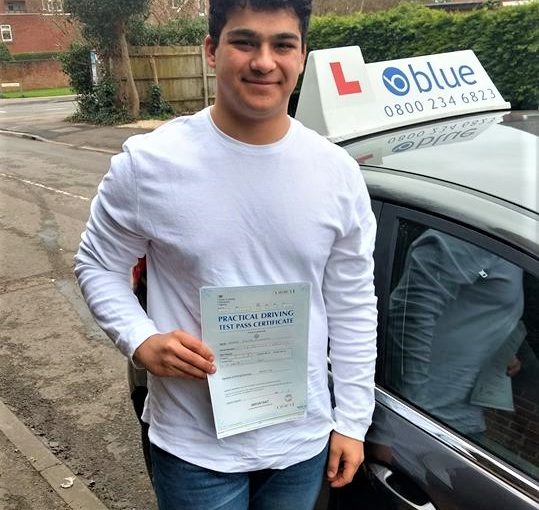
Bobak Mivehchi of Wargrave first time driving test pass at Reading
Posted in: Driving Lesson Reading, Learner Drivers Passing Test.
first time driving test pass at Reading
A great result for Bobak Mivehchi of Wargrave on a first time pass at Reading this afternoon with just 2 minor faults! first time driving test pass Reading
Congratulations from your instructor, David Shephard and all at Blue
Town Driving
Driving in town can be daunting: rush hour traffic, complicated junctions and traffic systems… learn the skills to deal with all these and more
The second part of the module is a practical session, covering the different features of driving in town, such as complex junctions and public transport. You’ll concentrate on
• observation, judgement and awareness
• eye contact
• consideration for vulnerable road users
• being cautious but not over cautious, and
• keeping space around your car
first time driving test pass at Reading
A busy town centre during the day or evening is fraught with danger from all sides. Rarely do we get the chance to get up to the 30 m.p.h. speed limit. Pedestrians, parked vehicles, taxi-ranks, buses, vehicles loading and unloading and road works are some of the hazards we have to contend with. By using the System of Car Control we have a systematic approach for dealing with any hazards we see-as and when they arise.
first time driving test pass at Reading
Observation: Throughout the whole System is the taking and using of information from what we can see and of giving information so that other road users know our intentions. The most basic requirement is that we know where we want to go – obvious but true. We need to know either the place name of where we’re going or a road number. By looking at destination boards, road signs, or lane markings we can position ourselves, in good time, on the approach to side roads, junctions or roundabouts. Before slowing down or changing position remember to always look in your mirror(s) to check for vehicles behind. Indicate to anyone, anywhere, who you consider would benefit from your signal.
Acceleration Sense: This can be defined as the ability to increase or decrease the speed of a car by use of the accelerator pedal – in response to what can be seen. This is only possible if a responsive gear has been selected for the road speed. For example, if you are in a line of moving cars, keep close observation of the cars a few places ahead and try to predict whether they are going to slow (brake lights flashing on) or turn at a side road (a change of position). Good forward observation will give you time to decelerate early if need be and to keep a reasonable distance between you and the ‘slowing’ vehicles ahead. With good planning you should be able to smooth out the stop-start habit of many traffic streams and ensure a smoother ride for yourself, your passengers – and those behind.
Traffic Lights: If you are in 4th gear doing 30 mph. on a level road and see ‘red’ traffic lights ahead, reduce your speed by using your brakes only – no gear changes. Over the last few feet before you stop, slightly relax the pressure on the brakes. This will raise the front of your car and enable you to glide smoothly to a stop.
If the traffic lights are ‘green’ then take 3rd gear on the approach and plan to pass through them in 3rd – for most cars a responsive gear at 30 mph 3rd gear would allow you to accelerate smoothly beyond the lights, if needed, and would provide good engine braking if the lights change to red and you have to stop. As you approach and pass through traffic lights remember to check both sides of the junction for danger. Also try to get your gear changing done before or after the junction so that both hands are on the steering wheel as you move through.
Tags: first time driving test pass at Reading